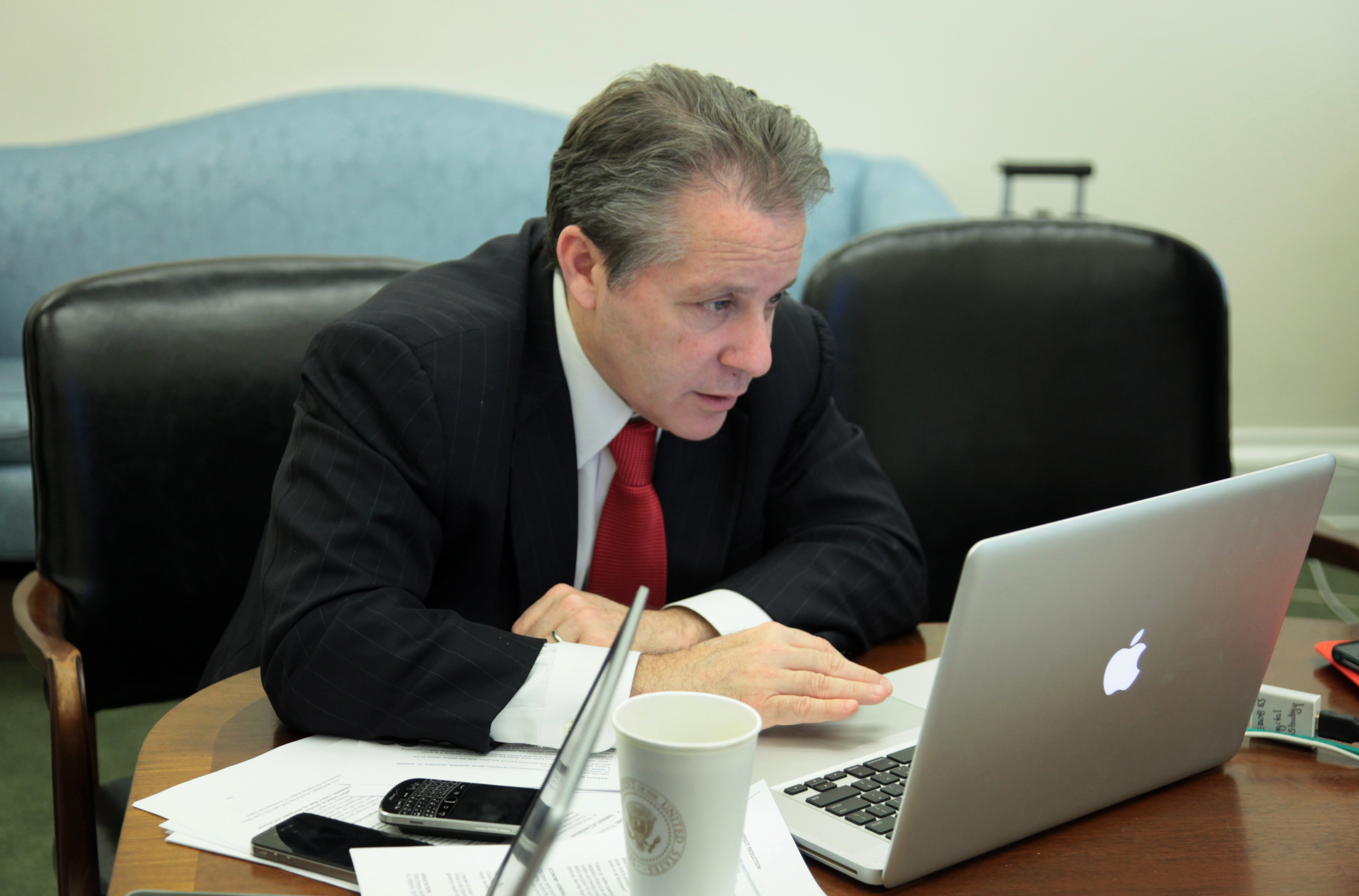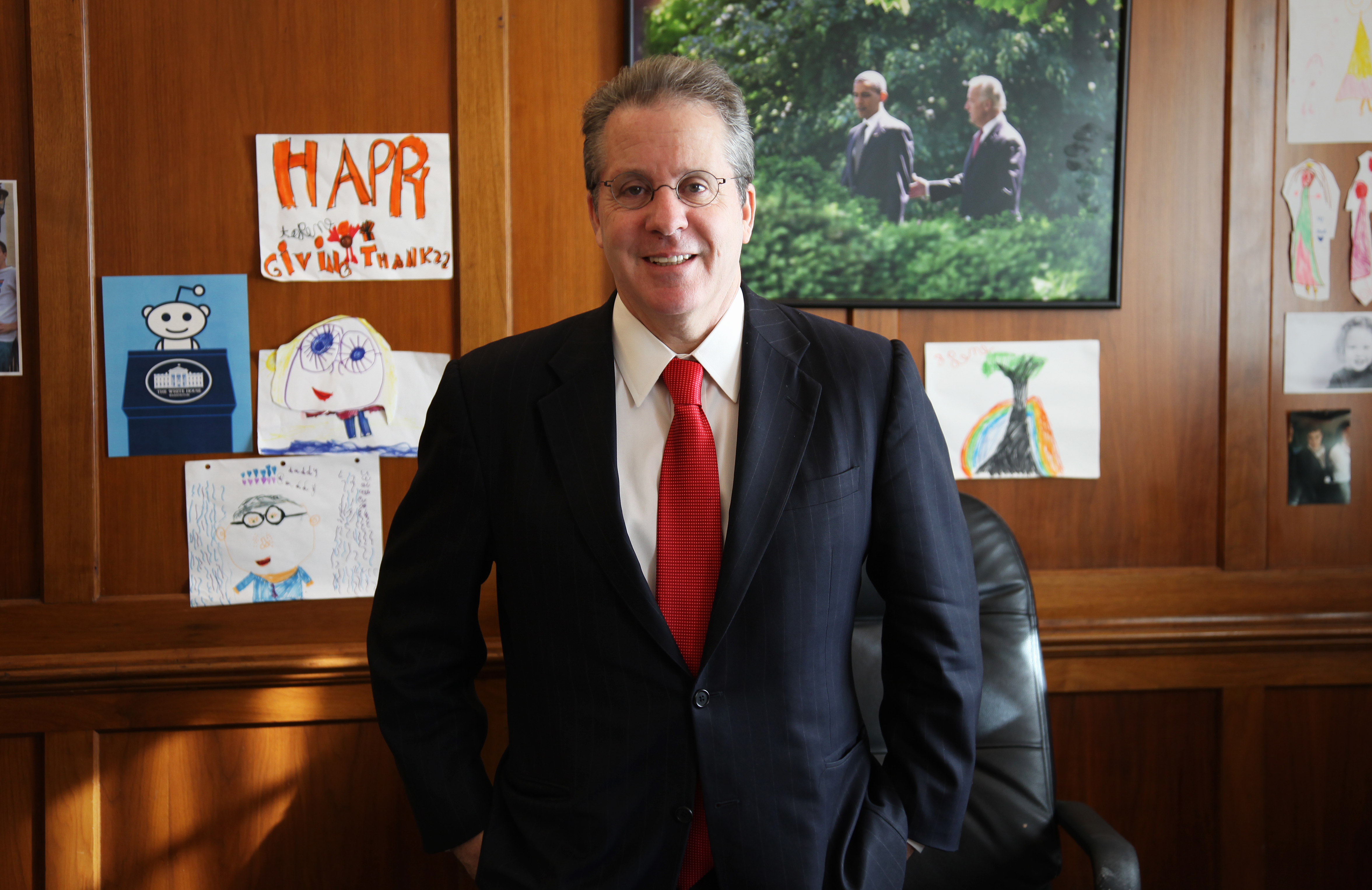
This afternoon, Gene Sperling, Director of the National Economic Council, turned to Reddit to answer some questions about the President’s plan to reduce the deficit. During the 'Ask Me Anything', Sperling responded to questions on a range of topics, including the President's proposal to raise the minimum wage and how the "The West Wing" (television show) compares to the actual West Wing.
You can see all of the responses on Reddit, or check out the questions and responses below.
Hey Reddit, I'm the Director of the National Economic Council and Assistant to President Obama for Economic Policy. I've been in the West Wing for a while now, having served on the National Economic Council for more than 10 years, starting in 1993 under President Clinton. Fun fact: I also consulted for the TV show "The West Wing." Really hoping you all are kinder than the folks at LemonLyman. As Josh would say, I applaud your interest in government... so ask me anything.
I'll be answering your questions from 2 to 3 p.m. EDT. I'd like to talk about the President's plan to reduce the deficit (which you can check out here: http://wh.gov/presidentsplan), but I'll be taking other questions too.
Proof: http://at.wh.gov/iRX2o
UPDATE: Great to be here, we're getting started now.
Question: Could you please explain the overall predicted economic effects of raising the minimum wage, as has been proposed by President Obama?
Reply: Most directly this will raise the wages of 15 million hard working Americans, many of whose wages are critical in determining whether they are able to provide the basics for their families. We believe strongly that as a basic matter of economic dignity no parent in our country who is working full time should have to raise their children in poverty. Increasing the minimum wage will unquestionably help achieve that basic goal. For other families who are trying to get ahead or have a seen a drop in income since the great recession, raising the minimum wage can help a second earner in the family provide that little extra for their children -- whether it's new clothes for school, a short family vacation, or a little extra put away for education or retirement.
Also because these are families with modest means they have what economists call "a higher propensity to spend" -- meaning that because they are living paycheck to paycheck they are likely to put that money into the economy right away. That means more demand and more customers for small business owners deciding whether to hire that extra worker.
A job is never just about a paycheck, it is about basic dignity. Raising the minimum wage, and indexing it to inflation, is one meaningful step we can take now to make sure more of our fellow citizens who are working hard have a bit more economic dignity in their lives.
Follow up question: I'm an economist. I do not understand your argument. Could you clarify on the following points?
1. About half of those 15 million hard-working Americans on the minimum wage are teenagers. Why is it a national priority to raise the wages of teenagers?
2. If raising incomes of poor households is an important policy goal, then why don't we use the EITC - which we know is a more highly-targeted tool towards low-income households? Dollar for dollar, the EITC does more good, so why aren't you going with that?
Thank you for your time.
Reply: Thanks for the note. Our calculation is that only about 20% of those who would benefit from the minimum wage increase are teens.
The President also strongly supports the EITC - and signed two increases to the EITC (a reduction of the marriage penalty and help for larger families) in 2009, and just recently fought to get them extended till 2018 in the fiscal cliff agreement.
UPDATE: Hey everyone. Typing out these responses is taking a little longer than I planned and I appreciate everyone's patience. I'm going to stick around a bit longer than I had originally scheduled so I can keep working through these.
Question: These questions all get at the premise behind the plan: that the deficit needs to be reduced.
With lending rates at such lows, why does the Administration believe it is even necessary to reduce the deficit at this point? Instead, why not use cheap deficit spending to make public investments?
How did the Administration choose the magnitude of the deficit reduction sought in this plan? In particular, how do you balance the loss of public sector investments and jobs that will cost more in the long run with short term budgetary gains?
Reply: These are not either or questions for us. A sound economic plan has to do three things at once: give more momentum to our recovery in the short-term, achieve long-term fiscal discipline in a balanced way and ensure that we still make room for the investments in our future -- children, education, infrastructure and research. It is having a strategy that pursues all three of those goals that hits the fiscal sweet spot. A smart plan, therefore can in the same overall package accelerate critical job creating investments like attacking deferred maintenance in our infrastructure and schools, while also putting in place tax and sensible entitlement reform that both contribute to deficit reduction while ensuring we are not crowding out critical investments in our competitiveness.
We chose the amount of long-term deficit reduction to ensure that our debt and deficits were falling as a percentage of our economy -- an important metric for ensuring confidence in whether the United States is still the best place to make long-term investments. We have already achieved $2.5 trillion in deficit reduction and believe achieving $1.5 trillion-$1.8 trillion more in a balanced way is the best way to hit that target. But I want to stress, the ultimate goal for economic policy is not hitting a specific metric, but whether the culmination of your policies lead to a stronger, more secure, and more inclusive middle class where everyone can rise, and where even children born into the poorest circumstances have a chance to reach their potential and where dignified work and retirement is promoted. That is why it makes sense and is consistent to have an economic plan that at the same time seeks to achieve enough deficits to see our debt falling as a percentage of our economy, while still finding additional savings to do something as smart and consistent with our values as promoting quality pre-school for every child, when we know that furthers our values and our future workforce.
Question: Australia is far better managed than the US economically. Why don't you do as Australia did 20+ years ago and stop subsidizing Agriculture? (Just about everything else as well) It costs you $50 billion a year and ruins the competitiveness of US farmers.
Reply: The President does in fact have a proposal to reduce agriculture subsidies in his FY2013 budget, and he proposed it again in his offer to Speaker Boehner. It would save $30 billion as part of his overall, balanced plan to reduce the deficit by more than $4 trillion.
Budget: http://obamawhitehouse.archives.gov/sites/default/files/omb/budget/fy2013/assets/budget.pdf
President's offer to Speaker Boehner: http://obamawhitehouse.archives.gov/blog/2013/02/21/balanced-plan-avert-sequester-and-reduce-deficit-balanced-way
Question: HSBC is a symptom of being too big to jail. How can a free market economy exist when big actors cheat, break laws, and only get fined. They just consider this a business expense. Should we break up the banks?
Reply: One of the main reasons the President put so much of his personal effort into passing Wall Street Reform was to end too big to fail. That’s why the bill he signed into law in 2010 – often referred to as "Dodd-Frank" – creates new tools to unwind large financial firms without destabilizing our entire economy. The law explicitly prohibits bail outs, and provides mechanisms to remove management and directors of failing firms that need to be resolved, wipe out shareholders, and protect taxpayers and our economy. Beyond that, Wall Street reform forces big financial institutions to hold more capital so when they make a mistake they pay for it – not taxpayers. And through what’s known as the "Volcker Rule" we will prohibit firms from making risky trades with insured consumer deposits. We think these reforms substantially change incentives. We’ve also proposed a financial crisis responsibility fee that would be imposed on the banks based on their size and risk, to help encourage a more stable financial system.
In terms of punishing wrong doing, I think we have a strong record. The president directed his DOJ to create a financial fraud enforcement tax force. Over the last few years, the justice department has filed 10,000 financial fraud causes against nearly 15,000 defendants – including more than 2,900 mortgage fraud defendants. These cases have resulted in guilty pleas and jail time. And we got the largest housing settlement in history, forcing five of the largest banks to pay billions in relief for families across America.
Question: Having just finished The West Wing I'd like to say thank you for helping to create one of the best programmes I've ever seen! A couple of questions for you: 1) Just how realistic is the show compared to your day-to-day life working in The White House? 2) I personally think the NHS is one of the best things about the UK (my home country). Do you think that more should be done to bring a nationalised health service to the US, even at a cost that will increase the deficit again?
Reply: On "The West Wing" -- I always have answered that it is pretty realistic, except that we are not as funny, don't walk as fast and most of us are not as good looking. The West Wing show aimed for reality, except that they often have to condense a 9 month process to 60 minutes. When President Obama asked me how life in the first six months of his administration during the financial crisis compared to normal times -- I gave the same reply: that we were being forced to do 9 months of policy work in what seemed like 60 minutes.
What I liked most about The West Wing -- and what was most realistic to me -- was that instead of portraying people in Washington as either cynical or naive, our boss, Aaron Sorkin did a great job at portraying serious and deeply committed and well-intentioned people trying to do good things in what is a very difficult, complex and political environment. That is how I think most of us -- on both sides of the aisle -- see our efforts. The West Wing captured that and I think it has inspired many young people to go into public service.
Finally, for me the best thing about 4 years of consulting and part-time writing for the West Wing is that it is how I met my wife Allison Abner. She was a writer on the show, and I met her the first day in my interview.
Ok.. that was a fun one, now back to the real West Wing issues.....
Question: Today, you refered to Chained CPI as "Correcting the CPI". Is there any difference? And can you explain your position on thie further?
Reply: The cost of living question relates to how the government measures inflation. Today, we use a measure of inflation called the “CPI” or consumer price index. An alternative would be to switch to what is known as the superlative or “chained” CPI. The superlative CPI makes two technical corrections to the standard CPI: it accounts for consumers’ ability to substitute between goods in response to changes in relative prices and accounts for biases arising from small samples. Most experts agree that the Superlative CPI provides a more accurate measure of the average change in the cost of living than the standard CPI.
The President would prefer to have this adjustment in the context of a larger Social Security reform, but he has said to Speaker Boehner that if it is part of a larger agreement that would include tax reform that would raise revenue by cutting loopholes and expenditures from the most well off, that he would be willing to agree to it because in divided government, if we’re going to make progress, we have to be willing to compromise. One important note: any agreement to make this change to the CPI must include a dedication of a portion of the savings to protections for low-income Americans, certain veterans, and older Social Security beneficiaries. Our current offer which reduces the deficit by $230 billion over the next 10 years includes those protections.
Question: Do you support granting shareholders the right to determine executive compensation? Also, what, in your opinion, is the best way to tackle the culture of excessive compensation?
Reply: One positive step forward has been the "Say on Pay" provisions that the President proposed and signed into law as part of Wall Street Reform. While this measure is non-binding, it has increased both transparency and shareholder voice. We've already seen in the last year several examples of high profile compensation packages being restructured due to this process.
Question: How hard will you push for cuts to oil subsidies to be in any sequester deal?
Reply: The President has long proposed eliminating unjustifiable subsidies for oil as part of deficit reduction, tax reform, and sound energy policy. Those are certainly the type of tax expenditure reductions that could be part of tax reform or a plan to delay or eliminate the sequester.
Question: Corporate tax rates in America are said to be high relative to the world at 35%, though the real rate is very competitive at around 13%. Why not close corporate loopholes and lower the rate, but even lower then that effective rate. Most econmists agree the corporate tax is a hamper to the economy. Lower corporate tax rates allow business to reinvent into their business, and that is especially true for small business who don't have the lobby power or accountants to get the lower effective rate. With higher capital gains, dividends and taxes for the rich caused by ACA and the Fiscal Cliff agreement, why not wait to tax a business when it takes money OUT of the business.
Thank You, P.S. Can I give you my resume to pass around the DC economic policy circles?
Reply: This is something we've looked at closely and the President has proposed a corporate tax reform framework that reduces the top rate to 28 percent (and 25 percent for manufacturing) and pays for it by closing corporate tax expenditures and loopholes. If this is done in a common-sense way that increases our international competitiveness while encouraging job creation on our shores and discouraging abusive tax-shelters and race-to-the-bottom behavior, this could be a win for everyone. You can read the framework at http://www.treasury.gov/resource-center/tax-policy/Documents/The-Presidents-Framework-for-Business-Tax-Reform-02-22-2012.pdf.
P.S. Regarding your resume, happy to take a look. Why don't you post it here? Not a bad way to get some exposure.
Question: In your opinion, what is the largest factor hampering the economy right now?
Reply: The good news is that we have seen several recent positive signs that our economic recovery is gaining momentum – the unemployment rate in March fell to its lowest level since December 2008. Our private sector businesses have created nearly 6.4 million jobs in the past three years. Home prices are rising at their fastest pace since 2006, and the manufacturing sector has added 500,000 jobs since January 2010, the fastest growth since the 1980s.
But there is no doubt we continue to face challenges. And to your question – one of the biggest factors holding us back is the refusal of Republicans in Congress to meet the President halfway on a plan to replace the sequester with a comprehensive, balanced plan to bring down our deficits in a way that still promotes demand in the short-term to give our recovery more momentum. If you haven't actually seen the President's offer, it's right here:http://obamawhitehouse.archives.gov/issues/sequester/the-presidents-plan
Take just one data point -- the independent Congressional Budget Office estimates that leaving the sequester in place will reduce GDP growth by 0.6% this year, and cost 750,000 jobs. That is an unnecessary hit on our economy at just the wrong time. Of course, we can survive this hit if the Republicans refuse to compromise at all, but as the President said, it is just "dumb," when you think about how much we should be working together to accelerate growth and job creation in our nation right now.
We in Washington must do better than that, which is why the President has not only laid out a specific balanced plan (here) but is reaching out to Republicans and Democrats to encourage a common sense solution that would put our economic recovery ahead of anyone’s ideological agenda. In fact, he just returned from a meeting with the House Republican conference on Capitol Hill.
UPDATE: This has been great. You know, there wasn't Reddit during the Clinton Administration (we used to even fax back then!)
I wish I could stay longer. Got to run to a meeting on the economic impact of immigration reform. (Reply if there's anything that you'd like to share on this). And while we have to fix our budget challenges, we have to keep making progress immigration reform and universal pre-k — which are key to both our values and long-term economic growth. Thanks.
You can learn more about the President’s Plan for a balanced approach to deficit reduction and economic growth at wh.gov/presidentsplan.




